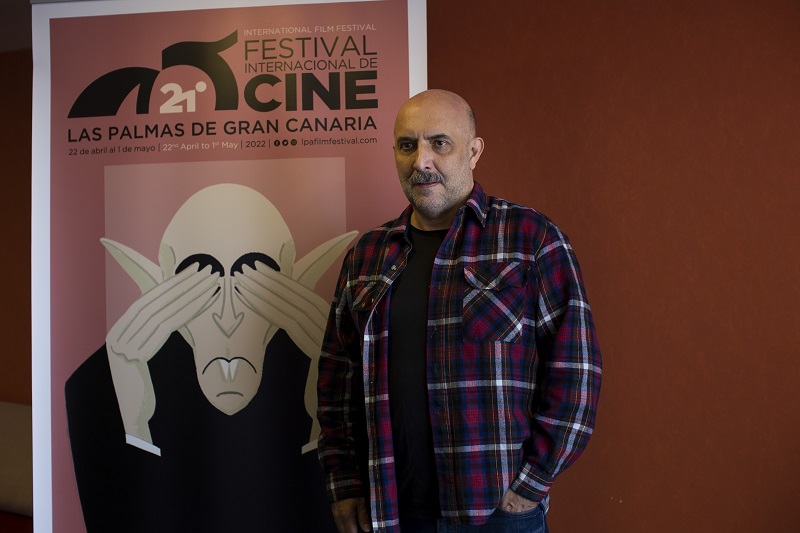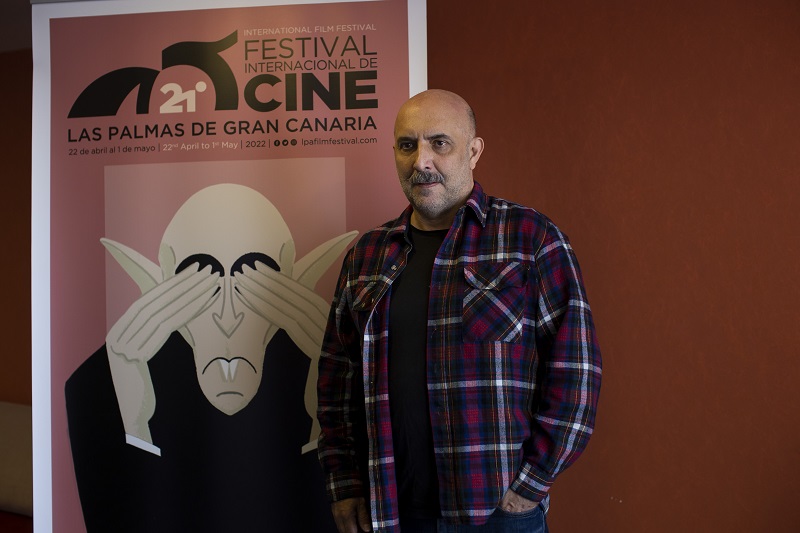- The Festival will show this reflection on death that depicts a declining old couple through a split screen today at 8 p.m., with a previous introduction given by the author himself, as well as on Sunday May 1
- The catalogue and full schedule of this 21st Film Festival are available at the official website lpafilmfestival.com

Las Palmas de Gran Canaria, Saturday 23 April 2022.- In 2021, Gaspar Noé made Vortex, his seventh film, which was selected at Cannes and Mar del Plata and obtained the Zabaltegi Best Film Award at the San Sebastian Film Festival. Now it has come to the Las Palmas de Gran Canaria International Film Festival as part of the Panorama section. An exquisite work that portrays the daily routine and decline of an old couple: she suffers from Alzhéimer and he from the heart. This depiction of everyday life that reflects on life decline will be screened, with a previous introduction by the filmmaker himself, this Saturday at 8 p.m. at Cinesa El Muelle Screen 5, and then on Sunday May 1 at 6:30 p.m.
In Vortex, the Argentinian director based in France has chosen two elderly people to show how an old man, who is focused on writing a book about cinema and dreams, takes care of his wife, who suffers from intense senile dementia. The film is a tough drama in which Gaspar Noé allows himself to philosophize about cinema, its meanings and functions. Ruthless and reflective, it is perfectly well-played with a free and improvised style.
Gaspar Noé, a radical and extreme author, wanted to capture on the big screen something that is rarely seen, old age and senile dementia. Maybe because of that Vortex is his less provocative and most personal feature film. As he explained this Saturday during a press conference, “I’ve seen this situation through my grandmother and my mother.” “These are very simple, painful and psychotic situations,” he confessed. Right before the pandemic he wrote a thin screenplay of barely ten pages that was later shot in twenty five days. “Everything happened very quickly,” he admitted.
Moving and captivating, one of this film’s key points is that it shows a real change in the director’s narrative style and aesthetic. Shot with two cameras, Vortex is a film in which the screen is split at all times, focusing on each character individually and thus offering the audience, as he said, “a kind couple they’d like to hug.”
To portray these two adjacent lives, “that double solitude, that shared space, each one inside their own bubble,” Noé casted the mythical Italian director of horror Darío Argento, who plays the main male character because of his charisma and because they’ve been friends for 30 years, in addition to considering him “a second father.” The rest of the cast are Françoise Lebrun, on the wife’s role, and Alex Lutz, who plays their son.
Filmed during the confinement, as the multi-awarded Gaspar Noé explained, the film was made with a crew of around 15 people, shut it a narrow space: the apartment. “It was very claustrophobic and suffocating because of the masks and because the ceiling was pretty low,” he pointed out. When the shooting ended “I felt as if I’d gotten out of a submarine, I lacked oxygen,” finished the filmmaker.
The Las Palmas de Gran Canaria International Film Festival, organized by the Culture area of the Gran-Canarian capital’s City Council through Promoción de la Ciudad de Las Palmas de Gran Canaria, has received public assistance by the ICAA [Institute of Cinematography and Audiovisual Arts] and the program for the internationalization of Spanish culture, PICE Visitantes, of Acción Cultural Española (AC/E).
Among the Festival’s collaborators we may find Cinesa El Muelle, El Muelle Shopping Center, Hotel Cristina by Tigotan, the Elder Museum of Science and Technology or Casa África, places which also function as seats or hold activities; as well as other institutions and companies such as Audiovisuales Canarias, Music Library & SFX or the International Bach Festival. Likewise, its market, MECAS, has been possible thanks to the sponsorship of the Gran Canaria Film Commission-Sociedad de Promoción Económica de Gran Canaria and the support of Canary Islands Film and Proexca.
The University of Las Palmas de Gran Canaria, the Mid Atlantic University, the Audiovisual Cluster of the Canary Islands, CIMA Canarias, the Asociación Microclima Cineastas de Canarias [Association of Filmmakers of the Canary Islands ‘Microclima’] and Repeople are also collaborators of the Festival.
Share this Post

